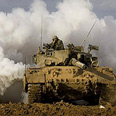
IDF in Gaza
צילום: AP
In praise of harsh response
Past experience shows disproportional response to terror acts a key for victory
Aside from the conventional wars that Israel fought in 1948, ’56, ’67, ’73, ‘82 and in the summer of 2006, the State of Israel has continuously confronted the challenges of terrorism since and even before its establishment.
The premise of Israel's willingness to sign the Oslo Accords and embark on subsequent withdrawals, including unilateral withdrawals, was that it would enhance Israel's security. The working assumption of various Israeli governments was that 1) the political process and land concessions would decrease the motivation for terror; and 2) if terrorism would not vanish, the Palestinian Authority would be more effective than Israel in combating Palestinian terrorism because their confrontation would not be "constrained by the High Court or B'tselem."
That was a misconception.
Land concessions furthered the quest for additional yields and enhanced the motivation for acts of terror. Terrorist actions were perceived by Hamas and other Palestinian organizations as a catalyst for further concessions rather than an obstacle. Concurrently, not only did the PA usually refrain from combating terrorism, it often covertly instigated it.
Many Western leaders and columnists have embraced the obtuse notion that terrorism cannot be beaten by force and must be appeased or addressed by other means. Yet nothing can be further from the truth.
Israel's counter-terrorism measures were most effective when it applied significant force against terrorist strongholds. The 2002 operation Defensive Shield is a good example. Examples from abroad include the elimination of the Assassins in the 11th century, the Arab Revolt of '36-'39, the Red Brigades, The Shining Path, The Bader Meinhoff gang and others prove that force is the best method for victory.
More recent cases are the Russians’ relative success against Chechen rebels and Turkey's success against the PKK, where the wholesale elimination of the terrorists' leadership usually leading to terror's demise.
Years ago Benjamin Netanyahu noted in brief that the "… the guiding policy should be based on an disproportional response to terrorism. For example, in 1999, after Hizbullah launched Katyusha rockets on northern Israel, we responded with a massive bombing of key infrastructure in Lebanon, causing millions of dollars in damage. The result was a long and quiet period for northern Israel. The key in deterrence and prevention is that the response or perceived response to a terrorist attack will be disproportional to the attack itself."
In our war on terror, Israel has historically chosen to battle terrorism with an iron fist on one hand, but in search of moderate counterparts for negotiations on the other hand. The latter has yet to be successful.










